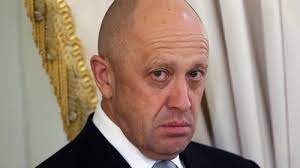Later the Wagner chief said that his troops were halting their march to Moscow to avoid bloodshed.
Pune
The war in which little has gone as per plan, received another twist in the tale, when Yevgeny Prigozhin gave a call to his Wagner Group to withdraw from their positions and march on to Moscow, against “the corrupt, self-serving generals and ministers.” But adding another twist later in the day, he ordered his soldiers to pull back from their march to Moscow, so as not to escalate the crisis
By then Wagner’s moves had sent tremors in the Kremlin and for the first time, struck directly at Vladimir Putin’s hold on power.
Just two months ago, Prigozhin and his group were feted as heroes after their successful capture of Bakhmut. But even then, the rift was apparent. Prigozhin had repeatedly accused the Defence Minister Sergei Shoigu and armed forces Chief General Valery Gerasimov, of conspiring to undermine his group and denying them supplies and ammunition. His comments that “the generals should be shot for their handling of the war” ruffled quite a few feathers as well. Perhaps he was getting too big for his own boots and in June, a proposal was put up by the Defence Minister to amalgamate the Wagner Group into the Russian military by 1 July. This move—supported by Putin himself—would put Prigozhin directly under the Defence Minister and weaken his own position.
Prigozhin refused to sign the agreements to that effect, and instead launched an expletive laced rant, in which he told Russians that the war was a lie, and an excuse for “a small group of scumbags to promote themselves”. He also accused the Army of launching a missile strike at one of their training camps and killing their fighters and demanded that the Defence Minister and Army Chief come to meet him. When the outrageous demand was ignored, he ordered his fighters to abandon their positions in the frontlines of Ukraine on 23 June, and march on to Moscow, in what was claimed as “not a military coup, but a march for justice”.
The 35,000 strong Wagner Group in Russia-Ukraine comprises their most battle-hardened fighters, who have been manning the frontlines for a year now. They are very well equipped, though they lack air support and have no internal logistics. In addition, around 15,000-20,000 fighters are protecting Russian interests in Sudan, Syria, North Africa and the Middle East. It is a formidable fighting force, more so since they swear loyalty to only one man—Prigozhin himself.
The group marched on Rostov-on-Don and Voronezh, the two centres that Russia uses as bases for their war effort in Ukraine. They quickly captured the military bases in both cities and took control. Russian air attacks on their convoys reportedly caused some casualties, but the group claimed to have even shot down three Russian helicopters and even set a fuel dump in Voronezh ablaze. At one point of time they were barrelling down in T-72 tanks and BMPs along the M4 Highway from Rostov to Moscow and were just 400 km away from the city.
The Wagner mutiny, though not directed at the military leadership and not at Putin himself, is a challenge to the Russian President; more so since Prigozhin was his close friend and he himself had built him up. Criticism of the war also reflects on him directly. Putin appeared weak and defensive when he denounced the action, by calling it “a stab in the back”. But he appeared conciliatory, and even appealed to the fighters, offering amnesty if they surrendered.
Prigozhin’s action has got the war dangerously close to Moscow, which has seen machinegun posts coming up along the main roads. He has tapped on the growing anti-war sentiment, by appealing to the soldiers to join him instead. The success of his actions will depend on whether the Russian soldiers remain loyal. At the moment there seems no uprising in the military itself, but should he spark a mutiny in the ranks, the movement will threaten not just the war effort, but all of Russia.
The timing of his action has come at a delicate stage. The Ukrainian offensive is just picking up steam. The vacation of positions by around 30,000 Wagner group fighters, has opened up large gaps in the front lines which can be exploited. This will weaken the Russian defensive layout, more so since Russian troops will now also have to look behind their shoulders should the Wagner fighters now turn against them. With Rostov and Voronezh under siege, the Russian logistics too will be severely curtailed. Even if the mutineers are halted short of Moscow, the Wagner Group still holds Rostov. That town will have to be cleared and the Russians may face a repeat of Bakhmut in their own territory. The prevailing chaos is an opportune time for Ukraine to exploit the gaps and push ahead. A series of military reverses on the battlefield will weaken Putin even more.
Could we be seeing a 1917 or a 1991 moment in Russia? It is too early to say. But Primozhin had warned of “weaknesses” for months before this action. He has revealed that the biggest weakness to Russia lies within. Should that weakness be further exploited, Putin’s war may just unravel very fast.
Col Ajay Singh (Retd) is the international award-winning author of “The Russia-Ukraine War.” He is a regular contributor to The Sunday Guardian.

